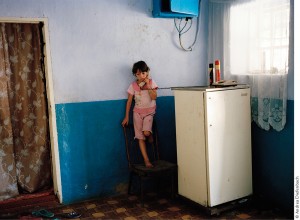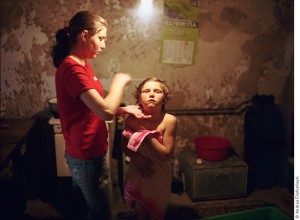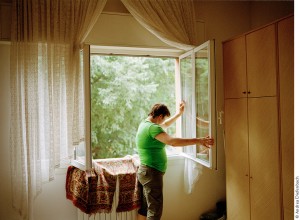Spazio Libri: Andrea Diefenbach - Land Ohne Eltern
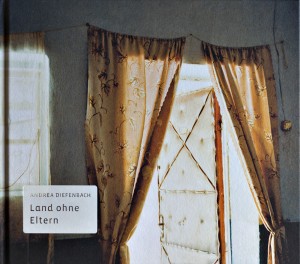
Booksigning and presentation Saturday 19th of October, 17.00
Renata Ferri (photoeditor of AMICA – Io Donna, Corriere della Sera) will be present.
The school was barely heated in winter. And now, in April, the first-grade pupils sitting in their classroom in a small village in the southern part of the Republic of Moldova were still wearing thick scarves and wool caps. “Whose parents live in Italy?” the teacher asked. Two thirds of the children raised their hands.
This is a scene one might encounter any day of the week in many towns in Moldova. In this small country on the edge of Europe, known mainly from stories about human trafficking or the illegal organ trade, thousands of children grow up without their parents. The Child Rights Information Center in the Moldovan capital of Chisinau estimates their number at 250,000. Some live with their grandparents, adult brothers and sisters, or aunts; others live on their own.
Prosperity was first to vanish from the Republic of Moldova, and then the parents. In Soviet days, the country was still considered rich, the orchard and vegetable garden of the Soviet Union. Today, it is the poorest country in Europe, where even wheat has to be imported. Of the four million Moldovans, one million seek work abroad. For them, Spain, Italy and Greece – are places of hope. Most of them live there illegally. Children and old people stay behind in their home villages. More than half of the emigrants go to Russia, but there are also around 200,000 Moldovans living in Italy. A whole armada of minibuses commutes between Italy and Moldova, a private transport industry that has emerged in Moldova. The drivers deliver not only parcels, but also cash. Emigrants send some 1.3 billion euros back to Moldova each year, equivalent to around one quarter of the country’s gross domestic product and more than the entire state budget. The money saves many families from poverty, but it can’t rescue the foundering economy. The children find all the necessities of day-to-day life in the parcels from their mother: jeans and t-shirts, shoes, spaghetti, chocolate, panettone cake, oranges and bananas, even dishwashing detergent, soap, and shampoo.
I have accompanied ten divided families for almost three years, the children in the Republic of Moldova and their parents who mainly live illegally in Italy, the country in the west to which most Moldovans emigrate.
The book is published by Kehrer
Organized in collaboration with MiCamera bookstore
The presentation is partly funded by the Grenzgänger Program of the Robert Bosch Foundation, Germany.
Andrea Diefenbach
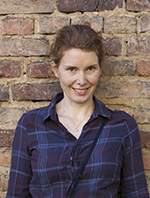 Andrea Diefenbach was born 19th April 1974 in Wiesbaden, Germany
Andrea Diefenbach was born 19th April 1974 in Wiesbaden, Germany
1995–98 apprenticeship as photographer
1998–99 work as freelance photographer and photoassistant
2000–06 studied Photography at University of Applied Science, Bielefeld, Germany
since 2003 work as freelance photographer
lives with her partner and son in Wiesbaden, Germany
AWARDS, SCHOLARSHIPS, RESIDENCIES
2013 Artist Talk, vfg Zürich, Switzerland
nominated for ›Kindernothilfe Medienpreis 2013‹
teaching phtography at Hochschule Darmstadt (SS 2013)
PDN Annual Award for LAND OHNE ELTERN
Artist talk ›Deichtorhallen Hamburg‹
2012 Unicef Photo of the Year, Honorable Mention
n-ost Reportagepreis 2012, 1st Prize
Artist talk, University of Applied Sience, Mainz, Germany
2011 Artist talk ›Bielefelder Fotosymposium‹
Artist talk ›Literarisches Colloquium Berlin‹
2010 Moving Walls 18, OPEN SOCIETY INSTITUTE, New York Finalist W. Eugene Smith Award Goethe Institute Sarajevo, 10 days artist in residence in Sarajevo
2009 Grant ›Grenzgänger‹, Robert-Bosch-Stiftung (Moldova/Italy)
Grant VG Bildkunst (Nepal)
DAAD-Scholarship (Nepal) Goethe Institute Sarajevo, 3 weeks artist in residence in Banja Luka
2008 Grant from Fotografie Forum Frankfurt for participation at the Houston Fotofest Nominee Deutsche Börse Photography Prize
Artist talk Summeracademy/Fotografie Forum Frankfurt
2007 Wüstenrot Award for Documentary Photography / Museum Folkwang
2007 Honorable Mention, Plat(t)form Fotomuseum Winterthur, Switzerland 2006
DAAD-Scholarship for ›AIDS in Odessa‹
BOOKS
›Land ohne Eltern‹, Kehrer, November 2012 (MONOGRAFIE)
›The Other Side Photography from Eastern Europe‹, Kehrer, 2012
›AIDS in Odessa‹, Hatje Cantz, 2008 (MONOGRAFIE)
›Gibt es die Welt auch ohne mich‹, Kehrer, 2008
›Jüdisches‹, Nicolai, 2006
›Atemwege, Leben mit Mukoviszidose‹, Kerber, 2005
MAGAZINE WORK
Stern, Spiegel, GEO, GEO special, GEO saison, GEO thema, GEO international, Geolino, Mare, Merian, Cicero, NEON, Nido, Brand Eins, Rolling Stone, Focus spezial, DIE ZEIT, ZEIT Wissen, ZEIT Magazin, Chrismon, SZ Magazin, Freundin, Brigitte, Brigitte Women, Für Sie, Frankfur¬ter Rundschau Magazin, ADAC Reisemagazin, MISSY Magazin, Vital, DU, Annabelle, NZZ, Le Monde, Ojode Pez, Nature, La Repubblica delle Donne, PDN, The Fader, Once Magazine, Foto Eight, Newsweek Japan.
EXHIBITIONS
UPCOMING
11/2013 ›Country without parents‹, Museum der Arbeit, Hamburg, Germany
02/2014 ›Country without parents‹, Folkwang Museum, Essen, Germany
PAST
2013 ›Country without parents‹, Stadtmuseum München, Germany
›Country without parents‹, Schaufenster Stadtmuseum Wiesbaden, Germany
Moving Walls 18, Open Society Foundation, London, GB
2011 Moving Walls 18, Open Society Institute, Washington D.C., USA
Moving Walls 18, Open Society Institute, New York, USA
›AIDS in Odessa‹, Apollonia Gallery, Strasbourg, France (SOLO)
2010 ›AIDS in Odessa‹, Latvian Museum of Photography, Riga, Latvia
›Country without parents‹, Wüstenrot Award, Goethe-Institute, Washington D.C., USA
›Country without parents‹, Wüstenrot Award, Photomuseum Braunschweig, Germany
›Country without parents‹ Wüstenrot Award, Kunstverein Ludwigshafen, Germany
›Country without parents‹, Wüstenrot Award, Städtische Galerie Brunsbüttel, Germany
›Frauenhaus‹, Frauenmuseum, Wiesbaden (Solo), Germany
2009 Art and it’s context‹, Museum of Contemporary Art, Banja Luka, Bosnia-Herzegovina
›Land ohne Eltern‹, Wüstenrot Award, Mathildenhöhe Darmstadt, Germany
›AIDS in Odessa‹, F-Stop-Festival, Leipzig, Germany
›AIDS in Odessa‹, Galerie Clamp Art, New York (Solo), USA
›Unmögliche Freundschaft‹, Darmstädter Tage der Fotografie, Darmstadt, Germany
›AIDS in Odessa‹, Kunsthaus, Wiesbaden (Solo), Germany
›AIDS in Odessa‹, Reiss Engelhorn Museum, Mannheim (Solo), Germany
2008 ›Photograhy meets Industry‹, Museo di Palazzo Pepoli Campogrande, Bologna, Italy
›Gibt es die Welt auch ohne mich‹, Kunstverein Bielefeld, Germany
›AIDS in Odessa‹, Freelens Gallery, Hamburg (Solo), Germany
›AIDS in Odessa‹, Lumix-Festival, Hannover, Germany
2007 ›Jüdisches‹, Jüdisches Kulturmuseum Augsburg-Schwaben, Germany
›Jüdisches Altenheim‹,›Rabbinerfrauen‹, Aktives Jüdisches Museum, Wiesbaden, Germany
›Jüdisches‹, Galerie Novi Hram , Sarajevo, Bosnia-Herzegovina
›Jüdisches‹, Jüdische Gemeinde Chemnitz, Germany
Plat(t)form, Fotomuseum Winterthur, Switzerland
2006 ›Jüdisches‹, Jüdisches Museum, Berlin, Germany
›Jüdisches‹, London College of Communication, London, GB
2005 ›Jüdisches‹, Historisches Museum, Bielefeld, Germany
2004 ›Atemwege‹, Konrad-Adenauer-Haus, Berlin, Germany
2003 ›out now!‹, Galerie, Bielefeld, Germany
2002 ›täglich extra‹, Amerikahaus, Bielefeld, Germany
COLLECTIONS
Folkwang Museum, Essen
Jüdisches Museum, Berlin
Stadtmuseum, München
Website: www.andreadiefenbach.com
